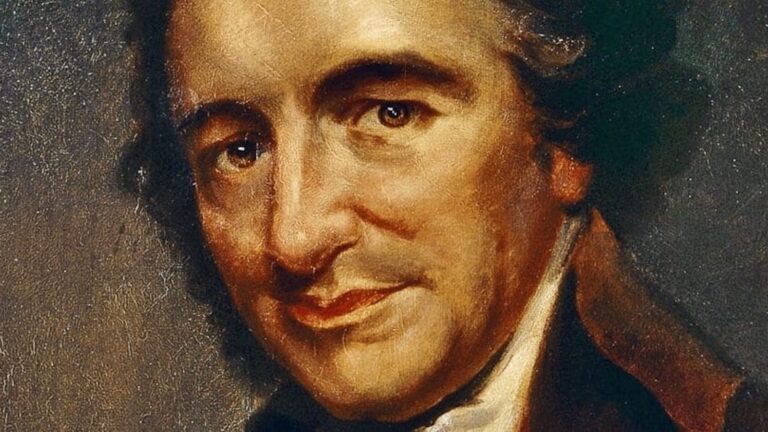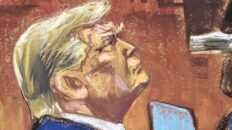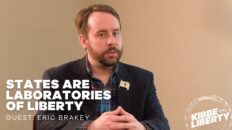In my two previous books, The Lost Diary of George Washington and The Lost Diary of Anne Frank, the evils of the authoritative governments of King George and Adolph Hitler were detailed. Through both traumatic times, good won over evil and two great nations were born as a result.
Roll forward to the state of the United States government today. The subtle creep of past oppression has hardly been noticed by the citizenry at large. But what if Thomas Paine, the firebrand of the American Revolution, were to suddenly appear in his historic home in New Rochelle this July 4th?
Once Paine gathered his bearings, he would find his home in the condition as the day he left. He would be shocked to hear his front door being unlocked by a museum attendant. The attendant would be equally alarmed to see the author of Common Sense standing before her. After an awkward introduction, one could imagine Thomas Paine inquiring about the state of his nation 215 years after he had left.
In the research for my manuscript, Thomas Paine Returns with Common Sense (which I am currently shopping for a publisher), the complaints he made in 1776 against Great Britain are the very same he would voice today. Here are a few examples (Paine’s words italicized):
Government is a necessary evil
“Society in every state is a blessing, but Government, even in its best state, is but a necessary evil.”
Paine said if people were pure, there would be no need for government. Since we are not, government is needed. But with government comes a trade of freedoms for security. A people must decide how much freedom are they willing to lose to feel safe. Because of the thirst for power, the government demands more with the promise of better care. Its driving force is a covetous belief that the citizenry has too much. The battle then becomes to get as much government as one can at the least cost.
Paine would submit today that we are content to give our freedoms away for a false sense of security. He would quote his contemporary, Patrick Henry, to us, “Is life so dear, or peace so sweet, as to be purchased at the price of chains and slavery?”
The Composition of the Least Oppressing Government
“A select number chosen from the whole body, who are supposed to have the same concerns at stake which those have who appointed them… prudence will point out the propriety of having elections often… [so that] the ELECTED might never form to themselves an interest separate from the ELECTORS.”
Since Government is a necessary evil, Paine suggested the kind of leaders to be chosen. He said they must come from the general population: store owners, farmers, blacksmiths, professionals, the rich and poor. He believed frequent elections were needed to hold them accountable. They should also return to live among those who elected them, to live under the laws they passed. They must be accessible. They must know they are no better than the people who chose them.
Thomas Paine would be aghast to find our representatives come from an almost exclusive profession with ample wealth to run for and hold office. He would be grieved to see they are inaccessible, and practically impossible to remove through elections because of the money required to oppose them. Like the far-removed parliament of his day, our government is an island in Washington, DC untouched by the struggles of the common people.
Under the rule of the British government, he complained the printers were carrying on the lies to deceive the public. The government and the media worked hand in hand. Paine would see the media in all its forms carrying on the work of the government today. It silences dissent. As a writer, the author of Common Sense would be shadow-banned to his disgust.
The Complexity of Government
“The more simple any thing is, the less liable it is to be disordered, and the easier repaired when disordered.”
Paine knew the more complex a government became, the harder it would be to correct. Appealing to the bureaucratic government of Great Britain was a foolish errand. Each official appealed to would direct the Colonists to some other branch. The abuses continued. The size of government provided cover.
Thomas Paine would find the acronyms of government bodies unanswerable to the people confusing. He would search for their source of power to find none granted by the people. The cancerous complexity neuters even the most zealous well-meaning elected official. Change is called for on our borders, on our debt, on the regulations and the loss of liberties. Yet all swear their innocence.
The Expense of Government
“The crown… derives its whole consequence merely from being the giver of places and pensions… which, in plain terms… impoverish the nation.”
Paine realized the only way King George could sustain power was to threaten force for obedience and give rewards to compliance. As a result, the nation took on substantial debt by giving gifts, taking freedoms, raising taxes, and reducing those who are able to pay.
To see a nation $34 trillion in debt by the same means in 2024 would bring Paine to the point of devastation. He would know this nation is not long for this earth. In his anger, he would demand an audience with Congress, but would be sent away. He would be too old, too poor, with no influence in the halls of monarchial power.
His only recourse would be to find some method to get an urgent call to the populace pleading they take a stand while there is still time to do so. He would quote Thomas Jefferson’s sad final solution, “Whenever any form of government becomes destructive… it is the right of the people to alter or to abolish it, and to institute new government”. May this be the election year where we the people take back the right of self-governance.














Add comment